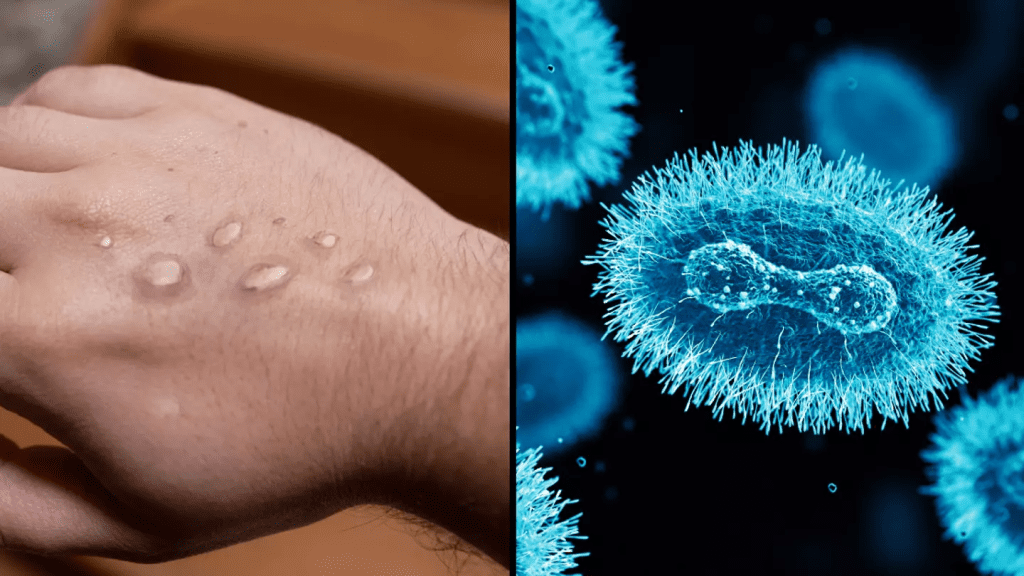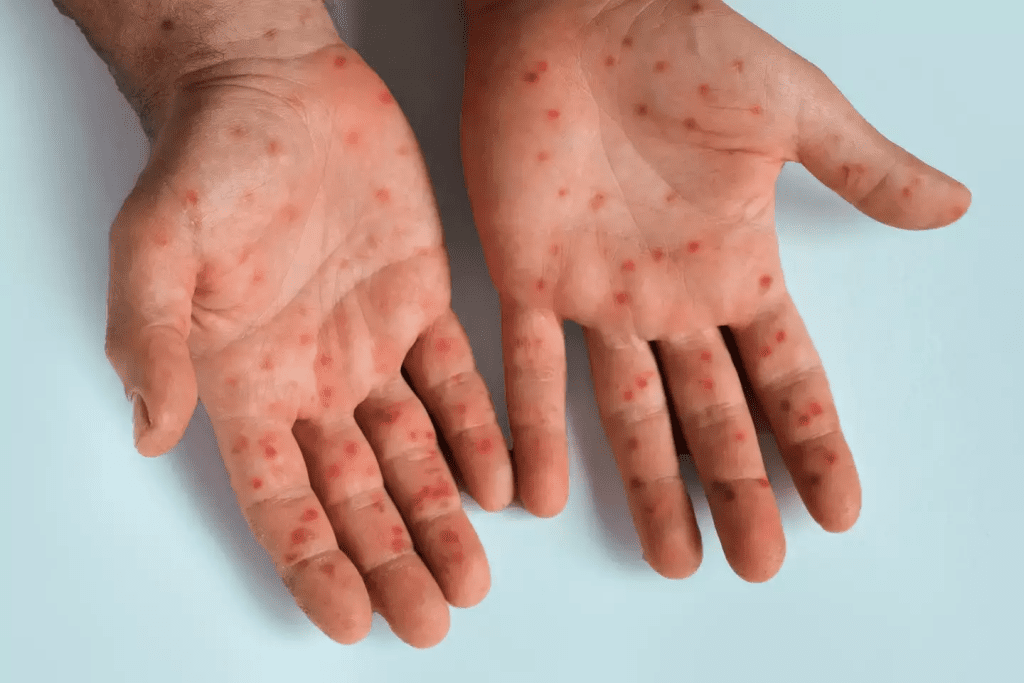A new and potentially dangerous variant of mpox, formerly known as monkeypox, has been detected in the United Kingdom, marking the first appearance of this strain in the country. This variant, identified as Clade 1b, has sparked concern, particularly among health professionals who are urging the public to stay informed on its symptoms and risks. Mpox, which became a global health emergency in 2024, is known for its painful and debilitating symptoms, and this new variant could pose additional risks if it spreads. Here’s what you need to know about the disease, the symptoms to watch out for, and the current public health response.
Mpox Reclassified: A Global Health Threat Reaches the UK

Previously referred to as monkeypox, mpox is a viral disease that can spread through close contact and bodily fluids. Although it’s known for affecting certain communities, notably in parts of Africa, the disease has surfaced globally, especially in the last few years. In 2024, the World Health Organization (WHO) declared mpox a global health emergency due to a surge in cases worldwide. The detection of this new variant, Clade 1b, within the UK has added to concerns, especially as it’s a different strain from Clade II, which had been circulating at lower levels in the country.
The recent case of mpox Clade 1b in the UK was confirmed by the UK Health Security Agency (UKHSA). According to officials, the infected individual had recently returned from a part of Africa where this variant is actively spreading. The patient reportedly began to feel unwell shortly after arriving in the UK and has since been transferred to the Royal Free Hospital High Consequence Infectious Diseases unit for specialized treatment.
What Is Clade 1b? Understanding the New Mpox Variant
Mpox Clade 1b is a variant that has only recently appeared outside of Africa, where it had been more common. It differs from Clade II, the variant previously seen in the UK, which has primarily affected specific communities, such as gay, bisexual, and men who have sex with men (GBMSM). Clade 1b has raised concerns because of its potential to cause more severe symptoms and complications. The UKHSA has stated that, while the overall risk to the UK population is currently low, they are closely monitoring the situation and actively tracing any contacts of the affected individual.
Professor Susan Hopkins, Chief Medical Adviser at UKHSA, emphasized the importance of the country’s health surveillance, which enabled them to detect this variant early. She assured the public that the health agency is working swiftly to identify and monitor anyone who may have been exposed, in line with established protocols for infectious disease control.
Symptoms of Mpox: Recognizing the Signs Early
Dr. John Burke, Chief Medical Officer at AXA Health, outlined four main symptoms of mpox that the public should be aware of:
- Rash Resembling Blisters: The most distinct symptom of mpox is a blister-like rash that typically appears on the face and body. These lesions can be painful and may scar if not treated carefully.
- High Temperature and Chills: Fever and chills are common early symptoms that resemble other viral infections, making mpox easy to confuse with illnesses like chickenpox or the flu.
- Body Aches and Exhaustion: Headaches, muscle aches, back pain, and an overwhelming sense of fatigue often accompany mpox, making movement and daily tasks difficult for those affected.
- Swollen Lymph Nodes: Swelling in the lymph nodes is a significant indicator of mpox and can help differentiate it from other infections.

Dr. Burke cautioned that these symptoms could easily be mistaken for other illnesses, particularly chickenpox. He stressed the importance of seeking medical advice if these symptoms are experienced, especially if there’s a recent history of travel to affected regions or known exposure to mpox cases. While the disease is often mild and most people recover without extensive medical intervention, he noted that an effective vaccine is available and can offer protection against future strains.
A Survivor’s Story: The Reality of Living with Mpox
Harun Tulunay, a London resident who contracted mpox in 2022 during a previous outbreak, shared his experience to highlight the serious effects of the disease. Speaking to Sky News, Harun recalled that his initial symptoms were flu-like, with a high fever and widespread muscle aches. As the illness progressed, painful lesions and scars began to cover his body.
“After two weeks of horrendous high fever and pain, I wasn’t able to move or drink or eat anymore—at that point, I was hospitalized,” Harun explained. His story paints a grim picture of the disease’s impact, particularly if symptoms escalate to the point of requiring hospitalization. Thankfully, Harun has since recovered and received the mpox vaccine, which he hopes will become more widely available, especially in regions like Africa, where infection rates are high.

Blistering on the hands is a sign of mpox (Getty Stock Images)
How the UK Health System Is Responding to the Mpox Threat
The UK’s response to mpox Clade 1b highlights the effectiveness of its infectious disease surveillance systems. The UKHSA has swiftly identified and isolated the case, reducing the risk of transmission within the country. Additionally, public health officials are actively tracing and monitoring any contacts of the infected individual. While the current risk to the general public remains low, these proactive steps underscore the importance of vigilance in managing and containing infectious diseases.
Professor Hopkins of UKHSA noted that the country’s established protocols for infectious diseases have been essential in responding to the new mpox variant. With a focus on tracing contacts and implementing safety measures, the UKHSA aims to prevent further cases and maintain public safety.
Preventative Measures and Vaccine Availability
For those concerned about contracting mpox, there are preventive measures and vaccination options available. The mpox vaccine, which has been shown to reduce the severity of symptoms, is recommended for high-risk individuals and those traveling to regions with high transmission rates. Health experts also advise practicing good hygiene, avoiding close contact with individuals displaying symptoms, and seeking medical advice promptly if exposure is suspected.
The vaccine, however, is not yet widely accessible in all regions, particularly in African countries where mpox is more prevalent. Survivors like Harun advocate for greater availability of the vaccine in these high-risk areas to prevent the spread of the virus and protect vulnerable populations.

Harun Tulunay in hospital with mpox (Harun Tulunay/WHO)
The Importance of Staying Informed and Taking Precautions
With new variants like mpox Clade 1b emerging, staying informed and taking precautions is more important than ever. Though the risk to the broader UK population is currently low, awareness of the symptoms and transmission risks can help reduce the spread of mpox. Following recommended health guidelines and consulting a healthcare professional if symptoms appear can prevent complications and ensure quick treatment if necessary.
Conclusion: Vigilance Is Key in Containing New Infectious Threats
The detection of mpox Clade 1b in the UK serves as a reminder of the ongoing challenges in managing infectious diseases in a globalized world. With quick action from health authorities and public awareness, the UK aims to keep the spread under control. Knowing the symptoms, seeking prompt medical advice, and staying informed about available vaccines are all steps that can help protect against mpox and similar diseases.


